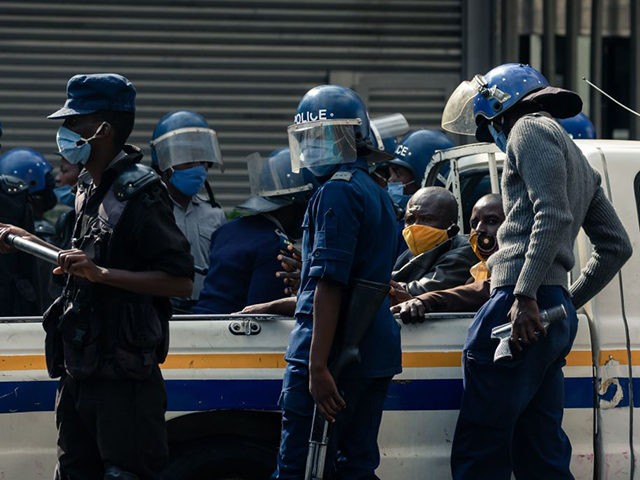A study published Thursday unveiled extreme abuses against local women in mining communities in Zimbabwe, particularly by security forces and police tied to the ruling socialist Zanu-PF party.
The study highlights abuses women face in communities rich in diamond mines, concluding Zanu-PF officials allowed torture, rape, killings, forced displacement, and other human rights violations to establish control of local mines and enrich themselves with diamond profits. Multiple women quoted in the study described being attacked by large dogs, threatened with sexual violence, and witnessing security officials bet on which local women each would later attempt to rape.
Zimbabwe’s mines, particularly its diamond mines, are the source of much of its natural wealth. Under late dictator Robert Mugabe and his successor and former intelligence chief Emmerson Mnangagwa, indigenous groups in areas with significant diamond reserves faced extreme state abuse and, ultimately, displacement, to allow companies affiliated with Zanu-PF to mine the area. Among those companies are Chinese companies accused of harrowing human rights abuses, including beatings, racist attacks, and “sodomy” against locals.
Zimbabwe’s Centre for Natural Resource Governance (CNRG), a research and advocacy group, in conjunction with several other groups published the study this week, titled, “Guns, Power, and Politics: Extractives and Violence against Women in Zimbabwe.”
“Mining in Zimbabwe, as elsewhere, takes place in a highly unequal, patriarchal and violent economic system of development based on the exploitation of people and natural resources,” the study noted. “This economic system ensures that a small elite, usually corporate interests connected to powerful ruling party and state officials, benefit from mining while the majority of people experience growing rates of poverty, landlessness and unemployment.”
The system, the research concluded, takes an especially onerous toll on women indigenous to communities that boast resources to be mined. The report particularly highlights the experience of women in Marange, found to contain diamonds in 2005, which it described as “the most securitised, politicised, and militarised [sic] mining area in Zimbabwe,” referring to its occupation by government security forces to exploit it.
Following the discovery, the report alleged, “police killed, tortured, beat, harassed, and set their dogs on artisanal miners in raids intended to drive them from the fields. Police also assaulted and arrested local community members in areas around the diamond fields, holding them in makeshift police camps for four to seven days.” Zimbabwe’s government had declared much of the local commerce illegal, resulting in police regularly demanding bribes — including sexual favors from women — and harassing locals for attempting to conduct business, according to the report.
The most harrowing example of how systemic sexual abuse towards women was in the region recounted in the study recalled eyewitness accounts taken by Human Rights Watch of “how police officers stationed in Chiadzwa in 2008 would amuse themselves by fighting over women and gambling on them. The winner’s ’prize’ was to rape the women for the night.”
Multiple women also said they suffered dog attacks, including being forced to take off their shirts so police dogs could bite their breasts.
Failing to fully control the area with state violence, Zanu-PF authorities “forcibly removed 1300 families from Marange to clear land for diamond mining” in 2008, according to the study. The displacements and attacks on locals were violent and often featured the rape of women.
The Mugabe regime, the study concluded, worked primarily to ensure that locals would not benefit from the discovery of diamond wealth, attempting to establish a stranglehold on mining in Malange. The few women who attempt to compete independently in the mining business, CNRG noted, found themselves bombarded with “incessant requests for bribes and sexual favours to secure the necessary permits.”
Towards the last days of the Mugabe regime, and currently under Mnangagwa, China has become a looming force in Marange mining. Zimbabwe is an enthusiastic partner in the Belt and Road Initiative (BRI), Chinese dictator Xi Jinping’s plan to dominate world travel by offering predatory loans to underdeveloped nations, to be used building railways, roads, and other connective infrastructure. When a nation can no longer pay off the loans — designed to not be paid off — China seizes the project itself, as it did in Sri Lanka.
Mugabe and Mnangagwa allowed Chinese companies to expand heavily in mining nationwide. In Marange, the Chinese company Anjin Investments has established a dominant position, the Harvard International Review noted in 2013.
“There are credible indications of gross human rights abuses against workers by Anjin management,” an unnamed watchdog is quoted in the Review as saying. “[W]orkers have been beaten with clenched fists, kicked around and called racist names by their Chinese employers. There are also reports of sodomy against the locals by the Chinese.”
There is no indication that the situation has improved for Zimbabweans facing Chinese discrimination under Mnangagwa. In July, a Chinese mining worker made headlines after Chinese businessman Zhang Xueun, his boss, shot him, leaving him permanently disabled. Xueun reportedly shot his employee because he demanded his salary, which the boss refused to pay.
More recently, in December, a Chinese mining company prompted outrage after reports of local individuals attempting to mine “illegally” on their own soil disappeared, in territory owned by the company. The company refused to search thoroughly for them despite reports that they were “buried alive” because it was too expensive.
Outrage against multiple Chinese mining companies also erupted this month in Makwa, Zimbabwe, over their systematic destruction of local roads in the process of seeking underground resources. Village groups described what was once a main thoroughfare as a “death trap” following the arrival of the Chinese.

COMMENTS
Please let us know if you're having issues with commenting.